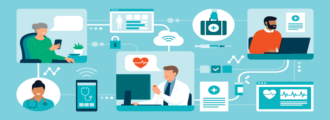With COVID-19 making it dangerous for people to meet up in person, many are turning to technology to handle everything from remote learning to friends/family hangouts to business presentations. Of course, technology is not only transforming our lives during this critical time, it’s saving lives too—researchers at the Cleveland Clinic, along with Epic, have recently developed and customized an EHR-based remote monitoring tool for COVID-19 patients.
Read on for a closer look at how the tool works, as well as why it illustrates just how important healthcare integration truly is for modern EHR companies.
How Does It Work?
COVID-19 patients can log into the mobile app or online and fill out a daily symptom questionnaire, and then clinicians monitor the severity of the patients’ reported symptoms, contacting them if additional medical attention is required. This setup offers the clinic a number of benefits, from extending the reach of the clinicians without increasing staff levels to helping to monitor patient health without increasing the risk of contamination (or cross-contamination) on behalf of the clinicians themselves.
What’s even more impressive, this remote monitoring tool was built and launched in just ten days when a task like this would have taken around three months, according to a quote from Dr. Eric Boose, associate chief medication information officer at Cleveland Clinic. While Epic and the Cleveland Clinic worked together to develop the tool, it’s now available for other healthcare organizations across the country to use.
Managing EHR in the “New Normal” of Healthcare
This remote monitoring tool is just one example of how EHR organizations can improve patient care during and post-pandemic, not to mention the importance of healthcare integration. As the world enters into whatever the “new normal” has in store for us, home monitoring tools are going to be vital, especially when it comes to treating high-risk patients. However, when healthcare workers are stretched to fight a global pandemic, making the best use of their EHR system is probably the last thing on their minds.
That’s where a quality healthcare integration consultant proves useful. A senior-level healthcare integration consultant has the technical know-how and years of experience to help customize and optimize EHR platforms so healthcare providers can focus on what’s most important: their patients.
EHR Optimization Opportunities
Not every healthcare organization is ready to create a new app to tackle the COVID-19 crisis, but there are plenty of tweaks and upgrades that can increase the value of your integration technology to make things more efficient and improve patient care. Here are a few examples of how our consultants can help:
System-Wide Review
First things first—a quality healthcare integration consultant needs to do an assessment to understand your current EHR system and how you’re utilizing it. Once they’ve done a thorough system-wide review, they can dive into optimization projects, ensuring you get the most bang for your buck.
Training and Education
Training and education is one area where most hospitals can see big improvements. Our consultants can help you find inefficiencies in user experiences and implement a training plan to ensure doctors, nurses, and other clinicians are taking advantage of best practices so that they utilize your solution effectively.
Customizations
Next, you can focus on customizations. Because not all EHR solutions are one-size-fits-all, an experienced consultant can help you design and configure your solution to meet your hospital’s unique needs. Of course, focusing on your operational goals is essential—fancy new features are nice, but don’t let the sizzle distract you from the steak. Any customization your EHR system needs must be accompanied by rigorous testing and training. That’s why it’s you need a dedicated, third-party expert on your side during this part of the process.
Governance
Another area that sometimes slips through the cracks is governance. Many hospitals make the mistake of failing to delegate leadership (or even delegate it incorrectly) when it comes to their EHR solution. It’s important that your EHR team includes all of its primary users, from physicians and nurses to the IT department. Luckily for you, a quality healthcare integration consultant knows the ropes when it comes to this sort of thing, and they can help you make sure everybody gets left out of the loop.
When It Comes to Medicine or Healthcare Integration, Trust the Experts
Whether you’re implementing a new EHR platform or optimizing the one you already have, doing so will require a collaborative effort from both your internal team and external partners. Tweaking your solution can lead to more efficiencies in the hospital, ensuring that you’re maximizing your investment. That’s why you need experts on your side.
Our senior-level healthcare integration consultants have the experience to help, whether you’re using Epic or any other HL7 engine. Contact us to learn more and get started.



